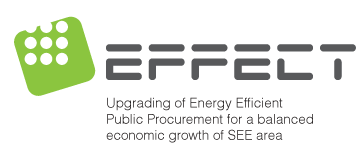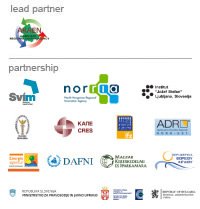Actions
The project is constituted by six Work Package to guarantee the correct implementation of the planned activities:
1- Transnational Project Management and Coordination
2- Communication and Dissemination
Project develops a communication plan acting on two different levels: Internal Communication: activities to enable a constant information flow within the partnership and within the regional laboratories developed through the use of intranet and network forum. External Communication: actions to disseminate the projects outputs and results towards the socio-economic and institutional target groups through the six-monthly newsletter, the dissemination materials produced, the participation in the most relevant events linked to Europe 2020 strategy.
3- Swot Analysis of Demand and Supply side EEPP procedures
The analysis phase will investigate the public procurement procedures, at national, regional and local level, in order to analyze and map the level of energy efficiency criteria adopted in SEE area public tenders and the barriers faced by private sector in the participation to energy efficient public tenders. Moreover, analysis will allow to carry on the analysis of the demand (public sector) and supply (private sector) side of public procurement procedures. The EEPP Demand side will be analyzed through a Swot analysis on SEE region public procurement procedures to find out the points of strength and weakness of EEPP processes in each project country; the EEPP Supply side will be surveyed through the direct involvement of the private sector to map barriers faced by private sector when they apply to energy efficient public tenders. WP3 results will increase the awareness of public administrations and private sector in each target area on EU energy policy objectives and public procurement requirements thus contributing to shaping of energy and public procurement policies to reduce the gaps that the analysis brought into light.
4 - Qualifying Demand side in Energy Efficient Public Procurement
Work Package aims to upgrade and qualify the Demand side of EEPP procedures on the basis of the weaknesses arisen through the Swot analysis to pave the way for the integration of national/regional/local public procurement procedures of SEE countries with energy efficient criteria in the next programming period, through the signature of a Memorandum of Understanding. To reach this objective, the work package foresees the direct involvement of public authorities representatives that will be trained on the common transnational Criteria to harmonize the existing public procurement procedures and to enhance them towards European requirement. On the basis of Transnational EEPP criteria public authorities will be supported involved to define and draft the EEPP Guidelines, that will be the tool for the concrete adoption of Energy Efficiency criteria during the next programming period (2013-2020).
5- Supply Side qualification through EEPP leverage
WP5 aims to foster the uptake of energy efficient mechanisms in SEE regions through the qualification of EEPP supply side in order to remove the non technological barriers faced by private sector in the participation to public tenders with Energy efficient criteria. WP5 will be realized with a participative approach: Partenrs involved will organize training sessions aimed to update private sector representatives competences and know how for the future participation to energy efficient public tenders and facilitate the reorientation of EEPP supply side towards less-energy intensive and high technology products and services. Private sector representatives will benefit from increased entrepreneurial skills on the management of energy efficient measures in the production processes and services.
6- Demonstrative Actions
Benefiting from the upgrading of Demand and Supply side SEE area public procurement procedures and from the integration of the EEPP Guidelines in the national/regional/local framework of countries involved public tenders including the EEPP guidelines adopted will be drafted and launched. On the supply side an Informational program and awareness campaign will be set up to communicate and disseminate among the local stakeholders the economic, environmental and energy benefits of the re-orientation of production process taking in consideration energy efficient criteria.
The project is constituted by six Work Package to guarantee the correct implementation of the planned activities:
1- Transnational Project Management and Coordination
2- Communication and Dissemination
Project develops a communication plan acting on two different levels: Internal Communication: activities to enable a constant information flow within the partnership and within the regional laboratories developed through the use of intranet and network forum. External Communication: actions to disseminate the projects outputs and results towards the socio-economic and institutional target groups through the six-monthly newsletter, the dissemination materials produced, the participation in the most relevant events linked to Europe 2020 strategy.
3- Swot Analysis of Demand and Supply side EEPP procedures
The analysis phase will investigate the public procurement procedures, at national, regional and local level, in order to analyze and map the level of energy efficiency criteria adopted in SEE area public tenders and the barriers faced by private sector in the participation to energy efficient public tenders. Moreover, analysis will allow to carry on the analysis of the demand (public sector) and supply (private sector) side of public procurement procedures. The EEPP Demand side will be analyzed through a Swot analysis on SEE region public procurement procedures to find out the points of strength and weakness of EEPP processes in each project country; the EEPP Supply side will be surveyed through the direct involvement of the private sector to map barriers faced by private sector when they apply to energy efficient public tenders. WP3 results will increase the awareness of public administrations and private sector in each target area on EU energy policy objectives and public procurement requirements thus contributing to shaping of energy and public procurement policies to reduce the gaps that the analysis brought into light.
4 - Qualifying Demand side in Energy Efficient Public Procurement
Work Package aims to upgrade and qualify the Demand side of EEPP procedures on the basis of the weaknesses arisen through the Swot analysis to pave the way for the integration of national/regional/local public procurement procedures of SEE countries with energy efficient criteria in the next programming period, through the signature of a Memorandum of Understanding. To reach this objective, the work package foresees the direct involvement of public authorities representatives that will be trained on the common transnational Criteria to harmonize the existing public procurement procedures and to enhance them towards European requirement. On the basis of Transnational EEPP criteria public authorities will be supported involved to define and draft the EEPP Guidelines, that will be the tool for the concrete adoption of Energy Efficiency criteria during the next programming period (2013-2020).
5- Supply Side qualification through EEPP leverage
WP5 aims to foster the uptake of energy efficient mechanisms in SEE regions through the qualification of EEPP supply side in order to remove the non technological barriers faced by private sector in the participation to public tenders with Energy efficient criteria. WP5 will be realized with a participative approach: Partenrs involved will organize training sessions aimed to update private sector representatives competences and know how for the future participation to energy efficient public tenders and facilitate the reorientation of EEPP supply side towards less-energy intensive and high technology products and services. Private sector representatives will benefit from increased entrepreneurial skills on the management of energy efficient measures in the production processes and services.
6- Demonstrative Actions
Benefiting from the upgrading of Demand and Supply side SEE area public procurement procedures and from the integration of the EEPP Guidelines in the national/regional/local framework of countries involved public tenders including the EEPP guidelines adopted will be drafted and launched. On the supply side an Informational program and awareness campaign will be set up to communicate and disseminate among the local stakeholders the economic, environmental and energy benefits of the re-orientation of production process taking in consideration energy efficient criteria.







